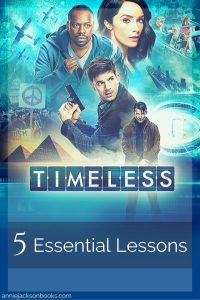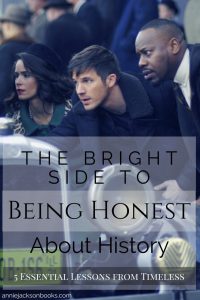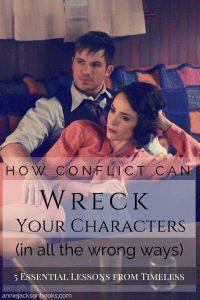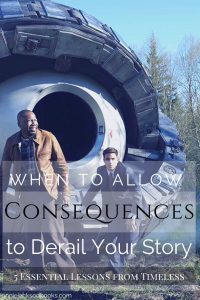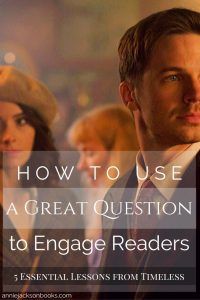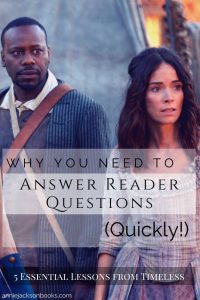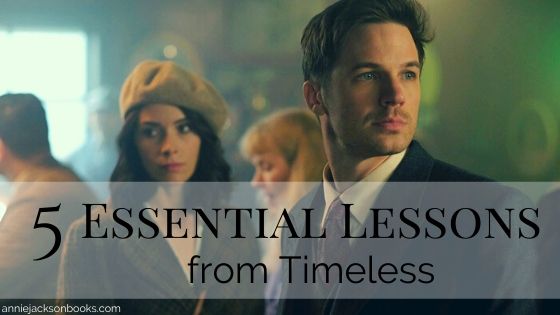Timeless is one of those shows that I misjudged, badly. I saw the previews when it debuted on NBC and didn’t think it looked that interesting or that the characters seemed that compelling. If they’d advertised the auspices of the show I’d probably have given the pilot a chance since I like Shawn Ryan and Eric Kripke both. How in the world did the guys from The Unit and Supernatural get together to make a show? And since they did, why in the world wouldn’t I watch it?
So, I was wrong.
Not only is Timeless compelling, interesting and fun to watch, there’s a lot to be learned from a collaboration of Shawn Ryan, Eric Kripke and a writers room full of women (I presume).
Ask Questions at the Start
The pilot of a tv show is not equivalent to the first book of a series. It’s the first chapter or maybe the first act. It’s meant to draw you in, to give you the world and the characters, capture your attention and then leave you wanting more.
I suspect this lesson comes to us from Kripke because you see it especially in Supernatural and also throughout his work. The opening act (whether that’s in a movie or the pilot in a tv show) always closes out the initial plot but leaves you with at least one compelling question.
And this isn’t a mystery story so the question isn’t in the plot. It’s a character question; something that leaves the characters reeling; one corner of their foundation unstable. And it’s that question that propels them into the larger story.
It also propels the audience into the story. Even if they keep reading only because they need to know the answer to that one question, they’re still reading your story. They’re spending time with your characters. And the hope is, of course, that by the time you answer that question they’re drawn into the story and characters enough to stick with you and see what happens next.
In many ways, this is similar to the little secrets lesson from Roswell, New Mexico. But secrets are different than questions, even if the intent to give the audience a compelling reason to stick around is the same.
So ask yourself, what question can you leave both the characters and the audience asking? What tears away at them enough for them to leave the safety of their known world and enter into the story?
I mean that’s probably plot 101 and you’re already asking questions like that. Or maybe you’re like me and you struggle with plot and any idea or exercise to not only get the story going but make it interesting is helpful.
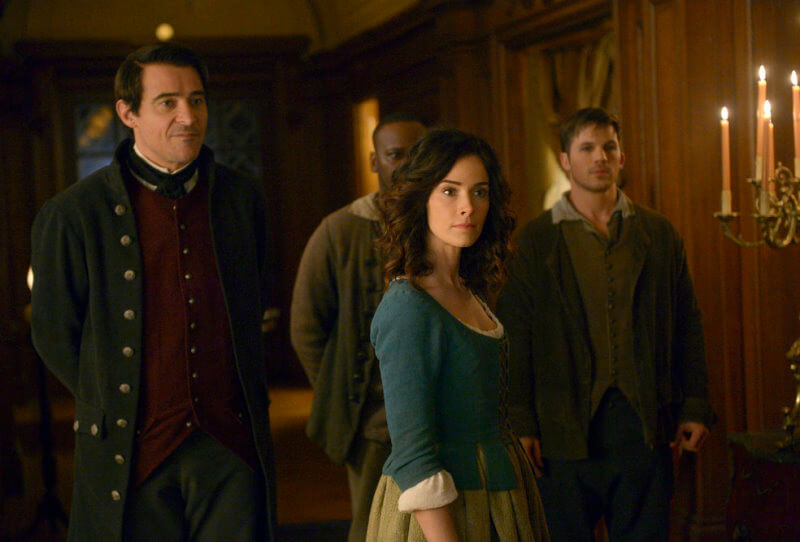
The Timeless pilot works for a lot of reasons–it jump starts the story, it dives into the characters, it’s funny, it’s interesting in how it twists the plot, but it excels because it asks a great question. The second time I watched the Timeless pilot it was with my 10 year old nephew. I had to explain the Hindenburg and a lot of what was happening to him. He was mildly interested in it all. But at the end he wanted to watch the second episode immediately. Because he needed answers.
Answer Questions Quickly
If questions are one way to draw your audience in and buy yourself time to hook them into your characters then lesson the second is don’t wear out their patience.
AKA the ‘Don’t be JJ Abrams’ lesson.
By the second episode of Timeless, we’ve got the answer we need. We’re also hooked on the characters and the escapades through history. Straight away, we want to be along for the ride. Because if you do it right, once you’ve locked the reader into your characters you don’t need the questions anymore.
The advantage to answering questions early (aside from reader goodwill) is you don’t get stuck in them. You don’t have to drag the mystery out to fill an entire book (unless of course you’re writing a mystery) or try to sustain it for 13 episodes. It leaves you room to ask new questions; to let the story evolve rather than remaining stagnant.
When Timeless gets past the first question it moves into a series of nearly standalone episodes that are some of the most interesting in the series. The history in and of itself is both amusing and intellectually engaging. The characters are challenged individually and get closer to each other. There’s this great scene in The Watergate Tape where we truly begin to know our villain and it’s done in a counterpoint with Wyatt that’s fascinating. Without that question hanging over either the characters or the audience there’s so much room to move.
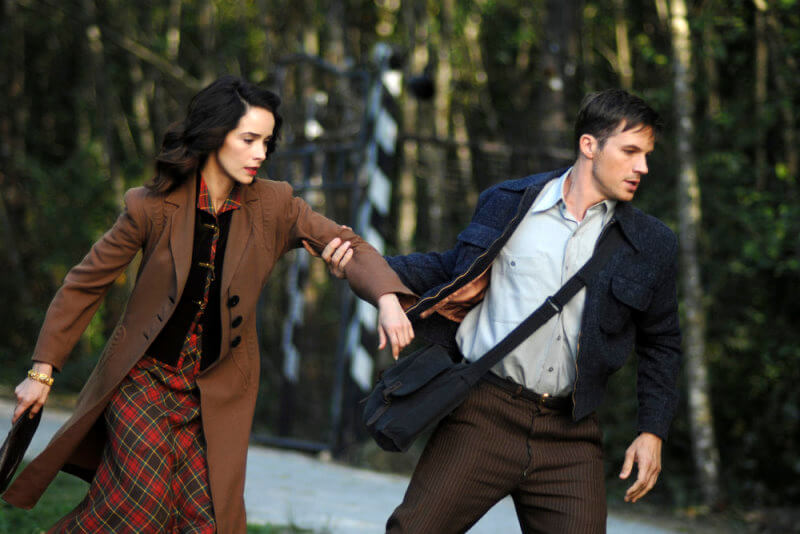
You even have the opportunity to explore the One Tree Hill lesson–the tragedy of getting your heart’s desire. It’s the kissing cousin of a Joss Crossroads–close but not quite. Timeless totally goes there in season 2 but that’s a lesson for later. When you pull it off right it can be some of the most compelling and beautiful drama.
Which leads us to lesson number three…
Don’t be afraid to follow through on consequences
A number of different shows have allowed the story to transform as the seasons progress, but this is a Timeless lesson so let’s get into time travel.
The threat of time travel stories is always that changing history will change the future. Sometimes this is the desired outcome, saving us from Skynet, and sometimes this is the threat. When it’s what the hero is going for, then history is changed (at least enough to save the world). When changing history is the threat, the status quo is preserved (or close enough to save the world).
Timeless straddles both sides of the time travel conflict and asks interesting questions along the way. How do you weigh saving lives vs. letting people die to save history? I mean, yes, this is The City on the Edge of Forever conundrum but Timeless makes it new and different by making it less about an individual and more grand in scope.
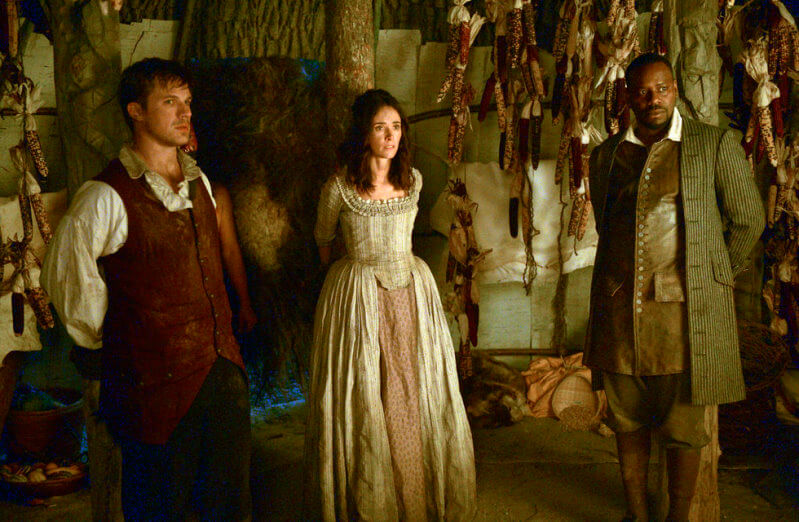
Is history worth saving? How far can you push it? Can you make it better? If you could alter the progression of slavery in our country how can that lead to anything but a better version of the future? Or will changing things always make it worse? (The answer to that one is, yes, it will always be worse because this is a story and stories thrive on conflict.) Things get messy in Timeless trying to kill Flynn, letting history play out, making things equalize. And no matter if they’re trying to save history or change it, there’s always consequences for their actions in the future/present.
Now, maybe you’re not writing a time travel story so you think this lesson isn’t particularly relevant. Except that you don’t have to go back in time to make your characters live with the consequences of their choices. And you certainly don’t need time travel to let those consequences alter the course of your story in interesting and compelling ways.
What happens when things change just enough? Not to alter all of society but to pivot the story you’re telling. What if the consequences of a choice changes what characters want? That character desire is a core storytelling element and you’re allowed to let it change so long as it’s properly motived. How interesting does it become when revelations change the impetus of the story?
I’ll tell you what, it keeps things unexpected and interesting. And it stands in contrast to contrived conflict. Because contrived conflict often is a result of being unwilling to let the story follow through on the threads you start and let them change the story or change the characters. When you let the story follow through on consequences you naturally create new conflict.
Only…
Don’t Wreck Your Characters to Create Conflict
So here’s the thing, Wyatt is the hero of the story. Lucy is the heroine. Whether a romance blossoms between them or not there is a companionship that holds the story together.
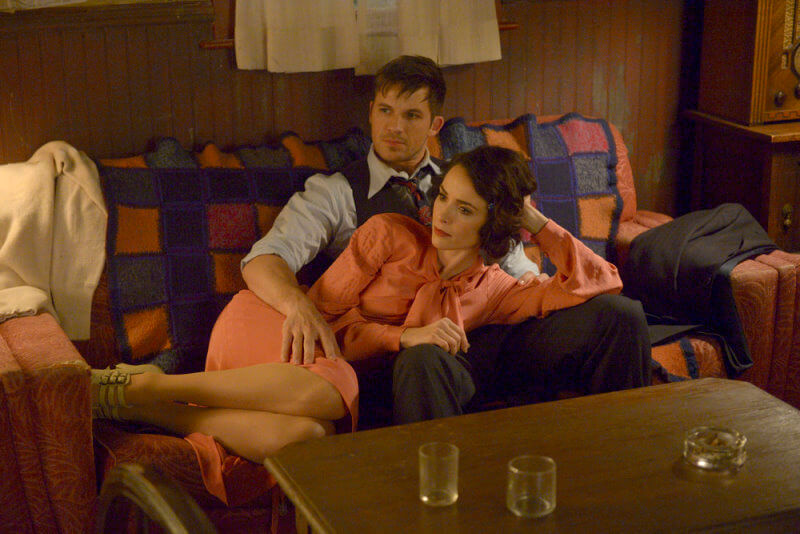
And in a post modern world heroes have to be flawed. Which is fine. But there’s a difference between a flawed hero and a tainted hero. One makes them more dimensional (hopefully) and the other makes them a little unlikable.
If you skipped the spoilers the lesson is this–don’t let the conflict you create sour the readers view of your characters. If you’ve spent time getting the reader invested and liking your characters then you don’t want to decimate all that effort. You don’t necessarily have to avoid going down a darker path but be aware and be careful who your characters become and the choices they make along the way so you don’t alienate your reader.
Also Bonus Lesson
Romance is all about audience investment and believability. You can tell the reader that two characters are in love until you’re blue in the face but if they don’t experience that through the course of the story they won’t believe it.
Be Honest About History
I know. In 5 Essential Lessons from Reign I extolled the virtues of rewriting history. Timeless is about the compelling and engaging way of telling the truth about history without flinching and without letting it take over the story.
I love, love, love every bit about how they handle the unsavory elements of history, particularly in regard to race and women.
Rufus: Also, I don’t know how it works across the pond, but I am black. There is literally no place in American history that’ll be awesome for me.
That is one of my favorite quotes from the show. It’s painful and it’s honest and it’s true and it’s also funny. Maybe it seems disrespectful but I think sometimes the best way to deliver hard truths to your audience is with a laugh. It diffuses the emotional charge and lets the truth seep through.
Timeless is a phenomenal example of telling stories with difficult, emotionally charged realities and doing so with grace, with honesty and without coming across as preachy. I don’t know what the make up of the writer’s room was, but I suspect Anne Cofell Saunders steered the ship a bit more in season 2. Because there’s a focus even more on women in history in the different episodes and also because the way Lucy deals with one of the big conflicts of the season is so nuanced and honest it’s rather brilliant.
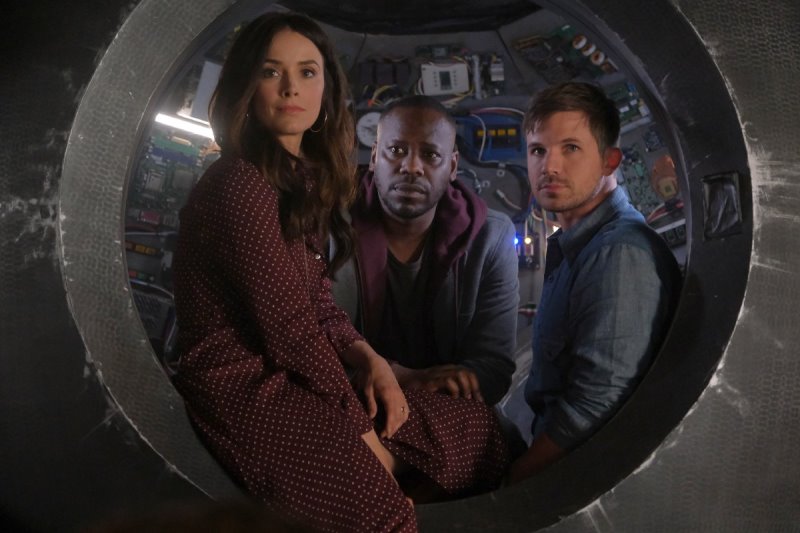
The bottom line is you don’t have to shy away from difficult topics. Don’t be afraid to be honest about the past, honest about the present, and to tell the truth in your story in a simple, straight-forward way. And if you’re not sure how to do that, watch Timeless.
Bonus Lesson 2: Create the Unexpected
Maybe this should be one of the primary lessons but the premise of the show is all about going back in history so that one won. Still, this is a pretty big lesson and an integral part of Timeless.
And the lesson is this–if you can provide believable motivation you can do almost anything in your story.
What if what your heroes primarily want changes as what they know and understand within the story changes? I think that’s one of the most daring parts of Timeless. Shows can get stuck in characters always wanting the same thing; always trying to solve the same problem or face the same character flaw. Letting them evolve risks the audience and if you attempt it in your story you risk your readers.
I mean, what if they don’t like this version of the character as much? Isn’t it better to keep the character stagnant knowing the audience likes them? The key is to allow what they want to shift without changing who they are. If you can pull that off you have the potential for a series instead of a stand alone novel.
Or is the bad guy actually the bad guy? What if he becomes an ally of your heroes? This has a lot to do with their original motivation (or even hidden motivation–see Destroy Me for a prime example). As soon as you open the door to them being allies you create a new level of conflict with their methods.
Because, same goal or not, bad guys are typically identified by their violence, aggression and a disregard for compassion. Oftentimes, they’re so focused on the common goal they don’t see that what they’re doing makes them the villain so much more than why they’re doing it.
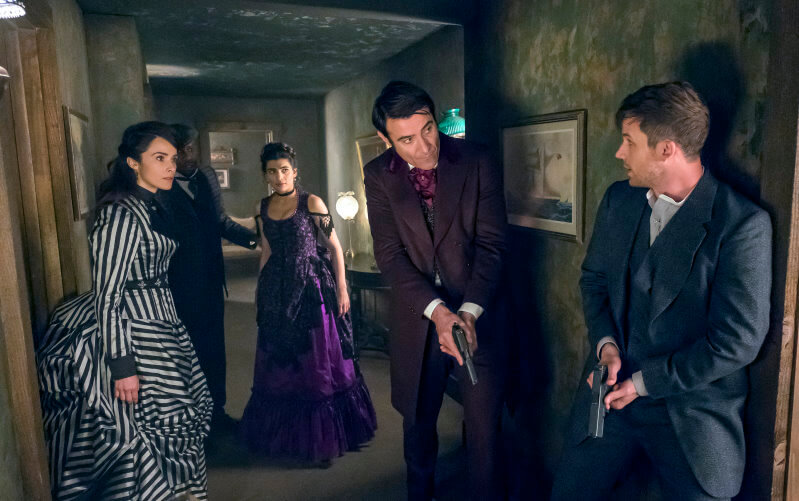
And when a story is full of secrets and hidden motivations, how can the heroes be sure they’re on the right side of things? What if half way through the story they’re not? What if the bad guy was actually the good guy all along and they didn’t realize it?
Bonus Less 3: The Power of Choice
This one is definitely a bonus lesson because it’s a repeat from Haven. But I really liked the underlying theme of choices and how that played throughout Timeless.
Within a time travel story, it’s the power of choice to shape your future; to decide who you want to be. And how interesting is it when they make the hard choice to create their future, even knowing the heart wrenching journey that leads to, because they also know where it ends.
It’s fascinating to watch and leads to interesting conversations in the show because the characters aren’t only given choices in the story (which is fairly common) but they are aware of the impact those choices will have and intentional about their repercussions. Intentionality adds a whole other dynamic to choices.
You don’t need characters who know what the future holds, though, if you’re not writing a time travel story. Having your characters intentionally make choices to define themselves and create the life they want is the very definition of agency. Having them talk about the effects of those choices and what those choices say about who they are is compelling (see the prior lesson on the methods of good guys and bad guys).
You’d think this would be more common in stories with characters who make choices as they traverse the plot. You might think, how is this a lesson at all? Because it’s not actually that common. And when a story grapples with choices and the impact they have and allows the characters to be intentional about what they decide it’s fascinating.
Timeless takes it one step further, not only exploring the power of choice but how vital the freedom of choice is to our humanity (through the lack thereof in Rittenhouse). That’s not a terribly uncommon theme but nestled within the time travel framework and coupled with the strength of watching our heroes make choices and live with the consequences it’s enough to reveal how deeply I misjudged this show.
Timeless is smart, emotional and asks difficult, interesting questions. We can hope our own stories do the same.
